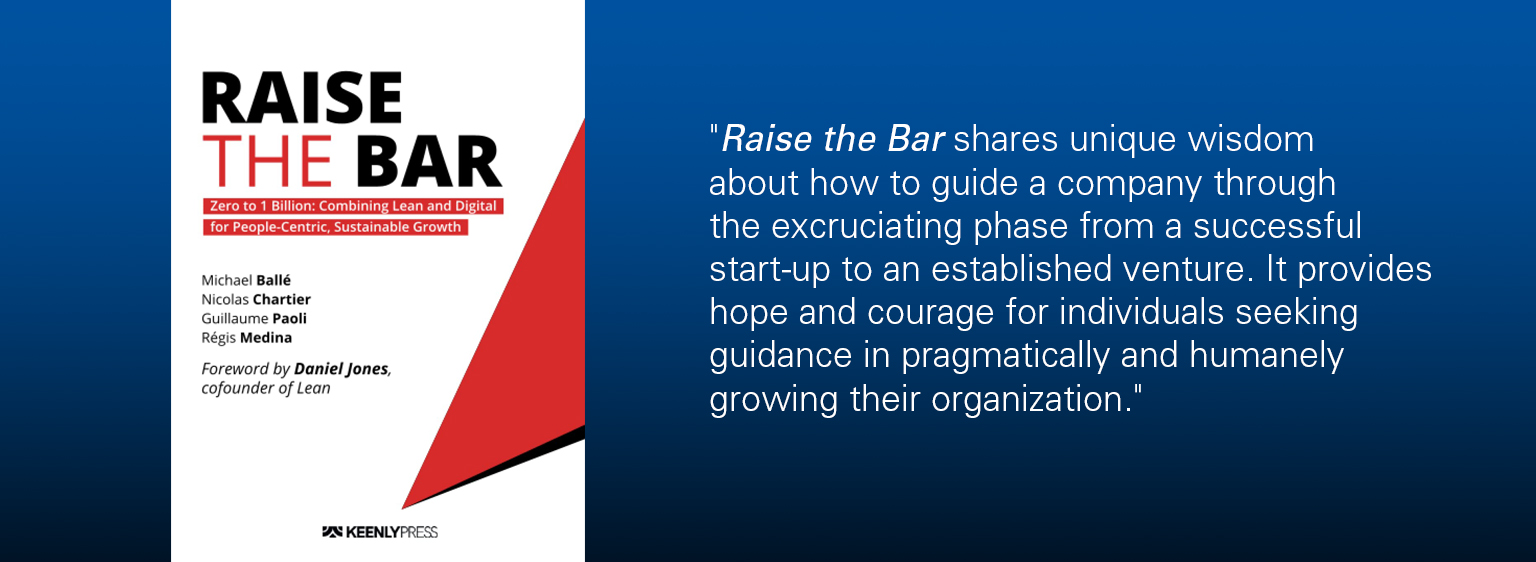Raise the Bar, a new book by Michael Balle, Nicolas Chartier, Guillaume Paoli, and Regis Medina, offers profound insights into the crucial challenge of managing the transition from a rambunctious start-up to a viable growing enterprise in a completely new manner.
The book tells the story of the Aramis Group, which found itself forced to try new methods to help manage its rapid growth from zero to more than 1 billion euros over less than 20 years. For these successful company builders, lean proved itself as an operational model for managing growth, not an early-stage way to validate nascent ventures.
Notably, unlike popular titles about start-up strategy — and faithful to lean thinking — this book grounds its lessons in actual experience, real experiments, and messy epiphanies borne out of the pragmatic demands of daily reality.
Placing the Book in Historical Context
When the concept of lean enterprise emerged four decades ago, most business thinkers and leaders considered this comprehensive approach as a way to improve quality and output for their organizations: a complete tool kit for competitive advantage. But, as hard as it is to imagine today, quality dominated the national conversation. At the time, W. Edwards Deming and Joseph Juran were recognized as critical thinkers, the Malcolm Baldrige National Quality Award made headlines, and lean principles helped inform a growing economic focus on improving things.
Jim Womack and Dan Jones’ books The Machine that Changed the World (1990) and Lean Thinking (1996) recognized and codified this system, adapted from the renowned Toyota Production System, as an enterprise-wide approach for boosting value by removing waste and leveraging the brains of every employee. Their books (and subsequent work such as founding the Lean Enterprise Institute and the Lean Enterprise Academy) were crucial in popularizing lean thinking and practices. Before long, most domestic manufacturers launched programs that improved quality and reduced defects. Leading consultancies — not to mention self-proclaimed “lean specialists” — built robust businesses teaching their own branded version. Business schools created related curriculums, and today, we have leading organizations such as Shingo awarding annual prizes.
In recent years, a deeper and more dynamic understanding of lean as a shared mindset and skillset oriented toward discovery and learning has emerged.
Much of this activity has depicted lean primarily as a set of tools to control operations, reduce defects, and boost output. And despite the clear message of, say, Lean Thinking, that the lean approach represents a comprehensive methodology touching everything from product development to sales, many leading thinkers have touted it in mechanistic and limited ways.
Today that is evolving.
In recent years, a deeper and more dynamic understanding of lean thinking as a shared mindset and skillset oriented toward discovery and learning has emerged. Books such as The Lean Strategy by Balle/Fiume/Chaize/Jones and Jeff Liker’s recent Second Edition of The Toyota Way have focused on lean as a radical new way of thinking. In this evolution, leaders at every level frame work as an ongoing cycle of experiments and reflection aimed at humanely challenging every person in the company to learn and improve.
Sharing a Real-World Example
Raise the Bar emphasizes these dynamic aspects of lean as a system of learning and exploration. The book shares how the founders of the fast-growing French online auto retailer (which has since gone public) adopted lean thinking and practices to manage their relentless growth and tackle the dynamic challenges most hypergrowth companies face. In the process, they embraced lean thinking as a powerful way of framing problems and stimulating learning at every level of the company.
Raise the Bar covers different ground than popular resources that teach people how to use lean thinking and practices at relatively static mid-size to large companies as only a means of reducing variation and boosting quality. Indeed, it belongs to a new set of books and articles presenting lean management as a systematic way of humanely engaging all employees in a shared scientific way of thinking that ensures continuous learning and improvement.
In this regard, Raise the Bar starts where other books end — with the real work of managing people at a fast-growing company, as it generates new daily crises that need permanent solutions, not frantic workarounds. As a result, it doesn’t sell the thrill of the romance but the tedious daily work of keeping that romance alive and growing.
To its enormous credit, the authors share the key lessons company leaders learned from experience and reflection. They chronicle how lean leadership practices can play a vital role in aligning and informing a fast-growing company’s daily work and direction.
The authors show, for example, how employees would respond to new obstacles as Aramis grew by trying things repeatedly until they discovered a solid countermeasure to the specific problem. They would then elaborate a standard from what they learned — enabling them to establish a foundation of best practices, which they could systematically improve. Above all, they document the struggles involved in embedding a culture of problem-solving.
The authors chronicle how lean leadership practices can play a vital role in aligning and informing a fast-growing company’s daily work and direction.”
Raise the Bar clearly shares the tension of preserving a balance, during hypergrowth, between flawless execution of standard practices and continuous introduction of mindful challenges to prevailing habits by mindful workers. Add to these challenges the new digital environment they occupied, which created as many new and unexpected problems as it provided new opportunities. The book reveals how everyone needed to live with the essential mindset of openness and learning while facing the constant demands of a start-up dealing with hypergrowth.
Raise the Bar draws from years of trial and error trying to manage the fundamentally unmanageable process of breakneck growth. For example, the founders struggled to serve this growth while creating a humane and professional workplace. As with many fast-growing companies, they were forced to choose between treating their employees instrumentally (ordering them to tackle problems in top-down ways borne out of the founder’s minds) or enabling the people doing the work to respond to new problems of rapid growth. While developing the inner strength NOT to fix their employees’ problems or control their work practices is an issue many companies face, it is particularly challenging for successful entrepreneurs.
Here’s how the authors (two of whom launched Aramis) describe the founders’ key problem:
- “Learning is hard enough when the solution is known, and you have to master it. But we had to learn how to learn: to discover what needed to be learned first.
- We knew businesses lose their customer focus as they scale — which is why we wanted to keep delivering great new features to our customers, to keep responding to their needs. We also knew companies lose their people touch as they grow, building a bureaucracy to support increasingly complex processes – which is why we wanted to offer new systems to our people so that they could retain their autonomy in doing their jobs. This is what we’d done as a start-up. We were lucky to early on recognize the immense potential of digital applied to a huge market such as automotive retail. As we looked at the car sales business, with its traditional brand dealerships and car salesmen, we had recognized four large digital opportunities: simplify, connect, automate, and predict. These helped us to steadily grow the business, but could they scale it up?”
I recommend this book heartily. Aramis has thrived; it went public recently and continues to grow, and the lessons from that journey endure. Raise the Bar offers proven advice from folks who share what they learned from their own grueling experience. It shares unique wisdom about how to guide a company through the excruciating phase from a successful start-up to an established venture. It provides hope and courage for individuals seeking guidance in pragmatically and humanely growing their organizations.




